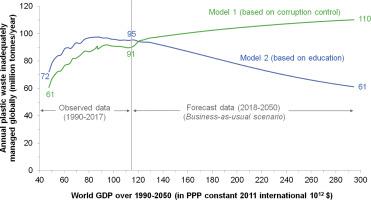Ecological Economics ( IF 6.6 ) Pub Date : 2021-01-18 , DOI: 10.1016/j.ecolecon.2020.106930 Mateo Cordier , Takuro Uehara , Juan Baztan , Bethany Jorgensen , Huijie Yan

|
Green economic growth led by technological solutions is often mentioned as a solution for mitigating plastic pollution. However, economic growth appears to be in contradiction to planetary boundaries. By developing two worldwide socio-economic models, for forecasting inadequately managed plastic waste up to the year 2050 across 217 countries and territories, we demonstrate the adverse ecological impacts of the lack of regulatory processes and educational environmental programs. We used country-by-country data from the World Bank for the model estimates. The global cumulative stock of plastic waste that is inadequately managed is predicted to increase from 61–72 million metric tons (MT) in 1990 to 5109–5678 MT by 2050. Four scenario analyses told different stories: The business-as-usual (BAU) scenario, mitigation scenario 1: Capping GDP, mitigation scenario 2: Extending education, and mitigation scenario 3: Fighting corruption. In “capping GDP,” the annual amount of inadequately managed plastic waste slightly increases and reaches 64–119 million MT/year in 2050 instead of 61–110 million MT/year in the BAU scenario. In the “extending education” scenario, the amount decreases by 34% compared to the BAU scenario in 2050. In the “fighting corruption” scenario, the amount decreases by 60%. We provide further details in the country-by-country predictions
中文翻译:

塑料污染和经济增长:腐败和缺乏教育的影响
人们经常提到以技术解决方案为主导的绿色经济增长作为减轻塑料污染的解决方案。但是,经济增长似乎与行星边界相矛盾。通过开发两个全球社会经济模型,以预测到2050年为止217个国家和地区的塑料废物管理不充分,我们证明了缺乏监管程序和教育环境计划对生态造成的不利影响。我们使用了世界银行的国家/地区数据作为模型估算值。预计对塑料废物管理不当的全球累积总量将从1990年的61-72百万吨(MT)增加到2050年的5109-5678吨。四种情景分析的结果各不相同:一切照旧(BAU) )方案,缓解方案1:限制GDP,缓解方案2:扩展教育,缓解方案3:打击腐败。在“封顶GDP”中,每年管理不善的塑料废物数量略有增加,到2050年将达到每年64-1.19亿吨,而在BAU情景中则为每年61-1.1亿吨。与2050年的BAU方案相比,在“扩展教育”方案中,该金额减少了34%。在“打击腐败”方案中,该金额减少了60%。我们在各个国家/地区的预测中提供了更多详细信息 与2050年的BAU方案相比,该金额下降了34%。在“打击腐败”方案中,该金额下降了60%。我们在各个国家/地区的预测中提供了更多详细信息 与2050年的BAU方案相比,该金额下降了34%。在“打击腐败”方案中,该金额下降了60%。我们在各个国家/地区的预测中提供了更多详细信息











































 京公网安备 11010802027423号
京公网安备 11010802027423号